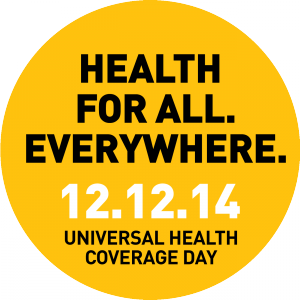
Universal Health Coverage Day
A new global coalition of more than
500 leading health and development organizations worldwide is urging governments to accelerate reforms that ensure everyone, everywhere, can access quality health services without being forced into poverty. The coalition was launched today, on the first-ever Universal Health Coverage Day, to stress the importance of universal access to health services for saving lives, ending extreme poverty, building resilience against the health effects of climate change and ending deadly epidemics such as Ebola.
Universal Health Coverage Day marks the two-year anniversary of a United Nations resolution, unanimously passed on 12 December 2012, which endorsed universal health coverage as a pillar of sustainable development and global security. Despite progress in combatting global killers such as HIV/AIDS and vaccine-preventable diseases such as measles, tetanus and diphtheria, the global gap between those who can access needed health services without fear of financial hardship and those who cannot is widening. Each year, 100 million people fall into poverty because they or a family member becomes seriously ill and they have to pay for care out of their own pockets. Around one billion people worldwide can’t even access the health care they need, paving the way for disease outbreaks to become catastrophic epidemics.
“The need for equitable access to quality health care has never been greater, and there is unprecedented demand for universal health coverage around the world,” said Michael Myers, Managing Director of The Rockefeller Foundation, which is spearheading Universal Health Coverage Day. “Universal health coverage is an idea whose time has come – because health for all saves lives, strengthens nations and is achievable and affordable for every country.”
For much of the 20th century, universal health coverage was limited to a few high-income countries, but in the past two decades, a number of lower- and middle-income countries have successfully embraced reforms to make quality health care universally available. Countries as diverse as Brazil, Ghana, Mexico, Rwanda, Turkey and Thailand have made tremendous progress toward universal health coverage in recent years. Today, the two most populous countries, India and China, are pursuing universal health coverage, and more than 80 countries have asked the World Health Organization for implementation assistance.
“Putting people’s health needs ahead of their ability to pay stems poverty and stimulates growth,” said Dr. Tim Evans, Senior Director for the Health, Nutrition and Population Global Practice at the World Bank Group. “Universal health coverage is an essential ingredient to end extreme poverty and boost shared prosperity within a generation.”
The 500+ organizations participating in the first-ever Universal Health Coverage Day coalition represent a diverse cross-section of global health and development issues, including infectious diseases, maternal and child health, non-communicable diseases and palliative care. Across these issues, knowledge and technologies exist to save and improve lives in significant numbers, but the impact of these tools is severely hampered by lack of equitable access to quality health services.
“Ebola is only the most recent example of why universal health coverage is the most powerful concept in public health,” said Dr. Marie-Paule Kieny, Assistant Director-General for Health Systems and Innovation at the World Health Organization. “Investing in strong, equitable health systems is the only way to truly protect and improve lives, particularly in the face of emerging threats like the global rise of non-communicable diseases and increasingly severe natural disasters.”
Events in 25 Countries Mark First-Ever Universal Health Coverage Day
Organizations around the world are calling on policymakers to prioritize universal health coverage, and are hosting events on 12 December to catalyze action, including:
- New York, USA: High-level event on Ebola and resilience, organized by the Permanent Missions of France, Japan, Germany and Senegal to the United Nations, in collaboration with The Rockefeller Foundation and the Columbia University Mailman School of Public Health.
- London, UK: Expert panel at the London School of Hygiene & Tropical Medicine on creating resilient, equitable health systems, organized in partnership with The Rockefeller Foundation and Action for Global Health.
- New Delhi, India: High-level event on universal health coverage implementation in both India and the global context, convened by the Public Health Foundation of India, Oxfam India and the World Health Organization Country Office for India.



